
Global health solution wins top prize at 31st Social Impact Showcase
GreenHouse awards more than $14,000 to five student founded ventures making an impact towards several UN Sustainable Development Goals

GreenHouse awards more than $14,000 to five student founded ventures making an impact towards several UN Sustainable Development Goals
By Angelica Marie Sanchez University Relations“GreenHouse, now in its 11th year of operation, has provided social innovation and entrepreneurship education to thousands of students, and has supported, through the Social Impact Fund, the development of 120 student-run social ventures — that’s a lot of positive impact, both for the students and for society as a whole,” said Richard Myers, principal at United College, during his opening remarks on March 27 at the GreenHouse 31st Social Impact Showcase.
GreenHouse is a social impact incubator hosted at United College and this fall the College will be offering a minor in Social Innovation and Impact to undergraduate students at the University of Waterloo.
The showcase is a celebration of the winter cohort of Social Innovators in Training and provides an opportunity for the students to create connections with community members who can help support their journey in refining their ideas. Students pitched their early-stage business venture ideas to an audience for a chance to receive funding from the Social Impact Fund.
The Social Impact Showcase held two rounds of pitches with 10 student-led startups competing for a total of $20,000 in available funding. From addressing food security to creating a platform for arranging in-home health care, GreenHouse announced the five winning teams who received between $1,000 to $8,000 in funding to support their social impact ideas. While Hydrobud was recognized with the winter 2024 People’s Choice Award and received an additional $1,000 in funding.
PharmaChill – $8,000
Adedayo Adefarakan, a student in the Master of Business, Entrepreneurship and Technology (MBET) program, founded PharmaChill to provide transparency and visibility in the last mile delivery of temperature sensitive pharmaceuticals in Nigeria.
When Adefarakan’s father was diagnosed with prostate cancer four years ago, he discovered that medicine injections were delivered from the pharmaceutical dealer, usually sandwiched or strapped to an ice pack — sometimes frozen or at times, the ice had melted already.
When he took his one-year-old daughter to the hospital for her immunizations, he started to question, “what if the potency and efficacy of this vaccine is actually reduced and she doesn't get the immunization that she needs because of the preservation process of the vaccine?”
But Adefarakan further discovered that this was an even more severe problem in Nigeria. Where 85 out of 1,000 children in Nigeria have died before the age of five due to vaccine preventable diseases. Adefarakan’s goal is to bring PharmaChill and its product, pharmabox, a temperature controlled pharmaceutical packaging solution to Nigeria to improve the quality of vaccines and immunization for children.
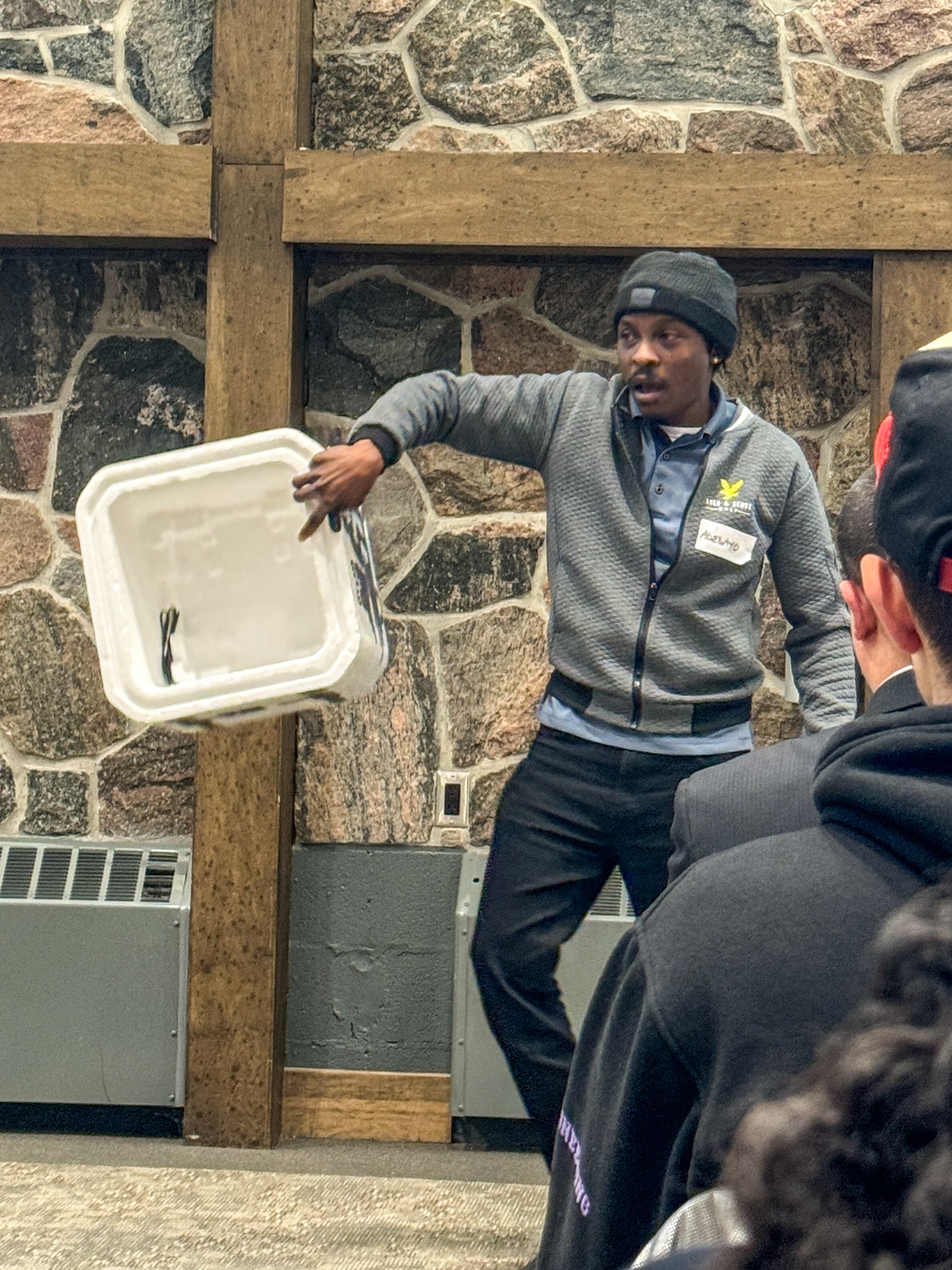
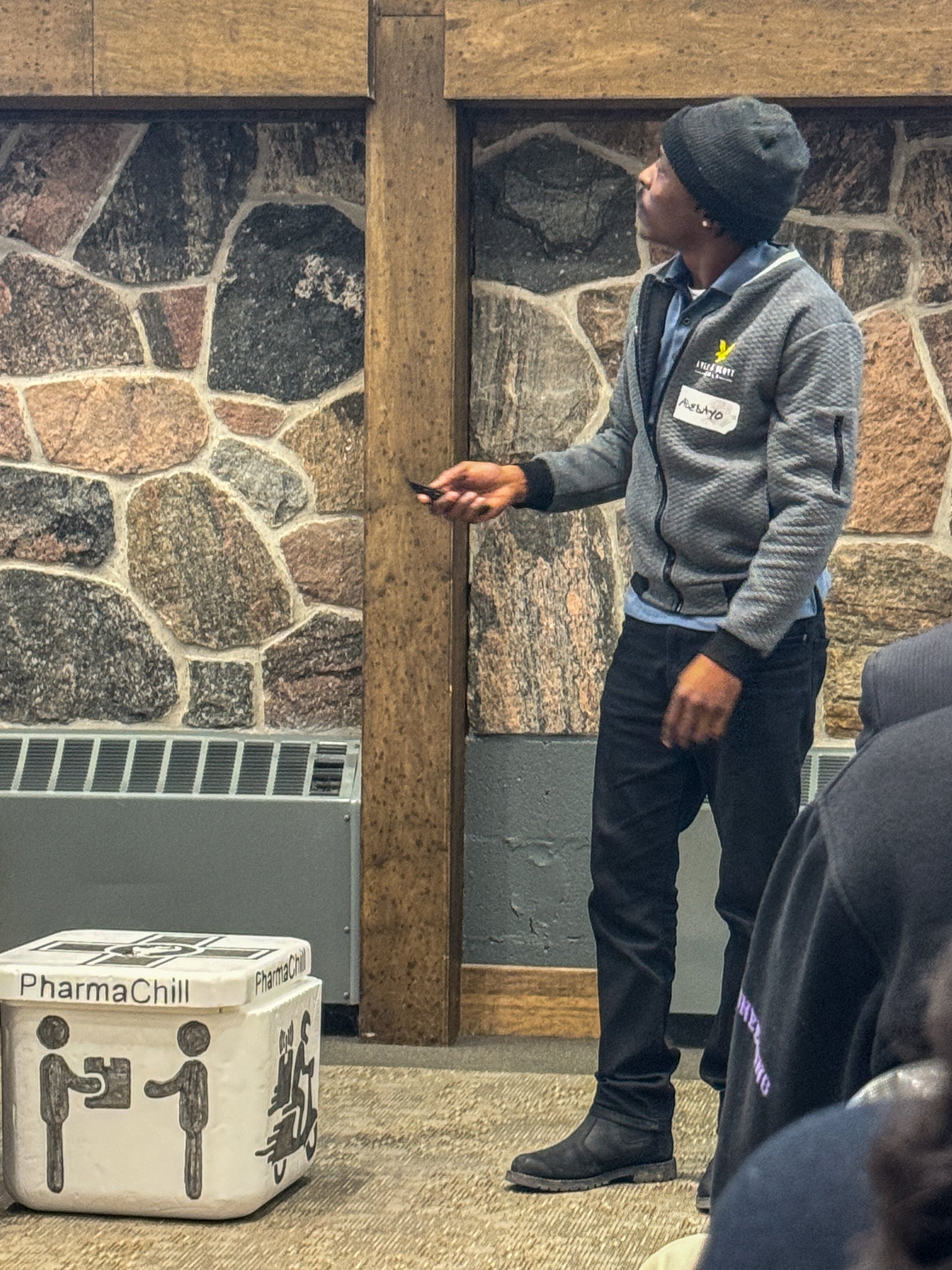
Adedayo Adefarakan, a student in the Master of Business, Entrepreneurship and Technology program, presenting his pitch on PharmaChill with the pharmabox prototype on display.
Learn more about PharmaChill’s innovative health-care solution on the Conrad School of Entrepreneurship and Business website.
Hydrobud – $3,000
Waterloo students, Alexis Windatt and Rumaisha Qadar, pitched their hydroponic company, Hydrobud, whose mission is to reconnect the citizens of Toronto with nutrient-dense leafy greens.
“In Toronto, one in 10 people rely on foodbanks with the age demographic ranging from 19 to 44 years old,” explained Windatt, a student in the Environment and Business program. “We hope to implement our HydroBuddy unit in foodbanks to help fight food insecurity.”
Hydrobud is a self-sustained hydroponics system that grows fresh produce for foodbanks. On average, a bunch of leafy greens are sold for $3.99 at grocery stores, while Hydrobud can grow one bunch for just $1.40.
Each HydroBuddy unit can grow 100 plants hydroponically within a 24-square feet container.
Currently, Food Banks across Canada manage a total of 200 food garden plots, producing fresh food for distribution. However, it is not nearly enough to meet their goal of having 60 per cent of all food distributed being fresh. The Social Impact Fund will help support their pilot project, where they hope to demonstrate the business case for producing fresh food indoors.
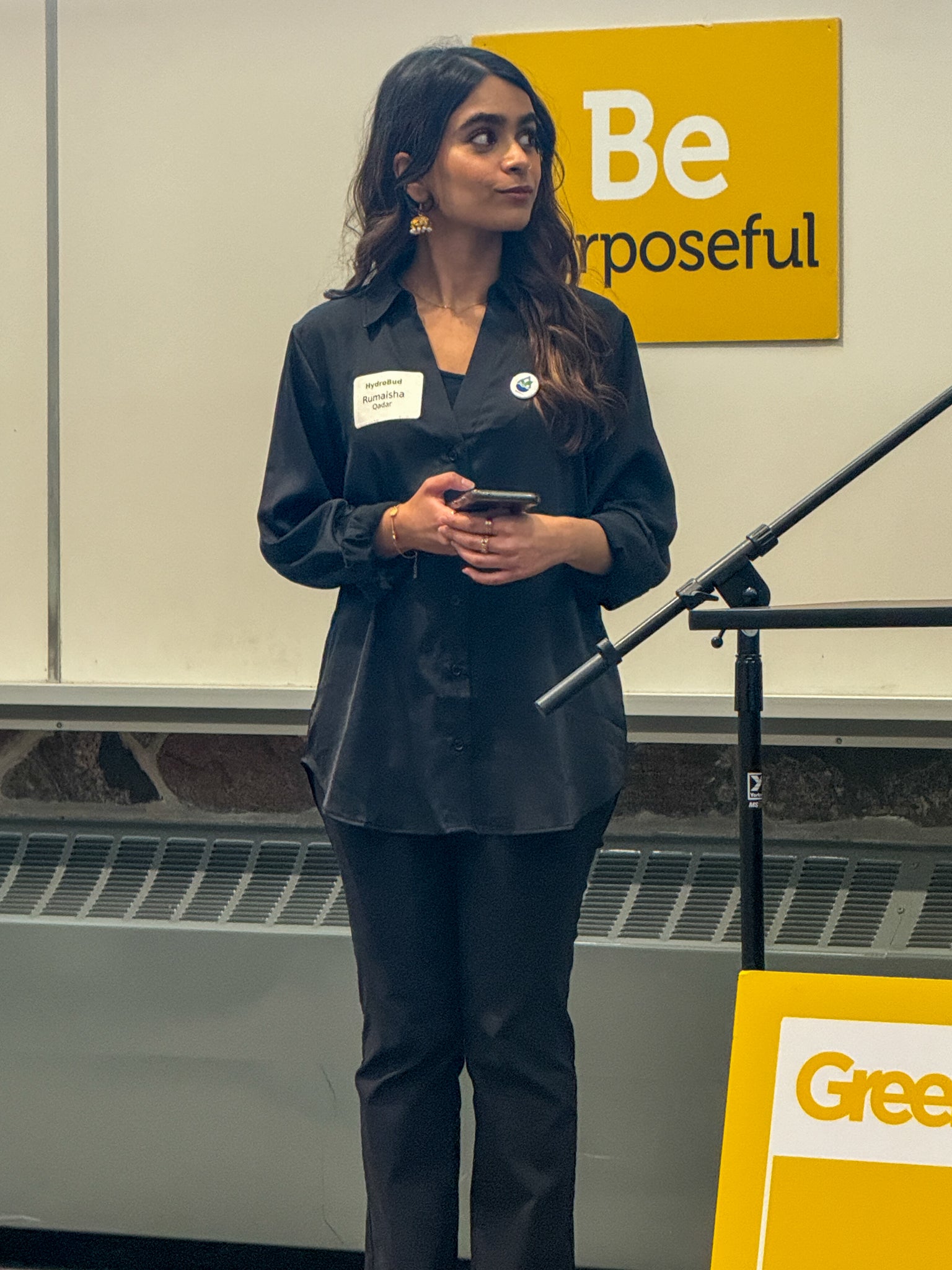
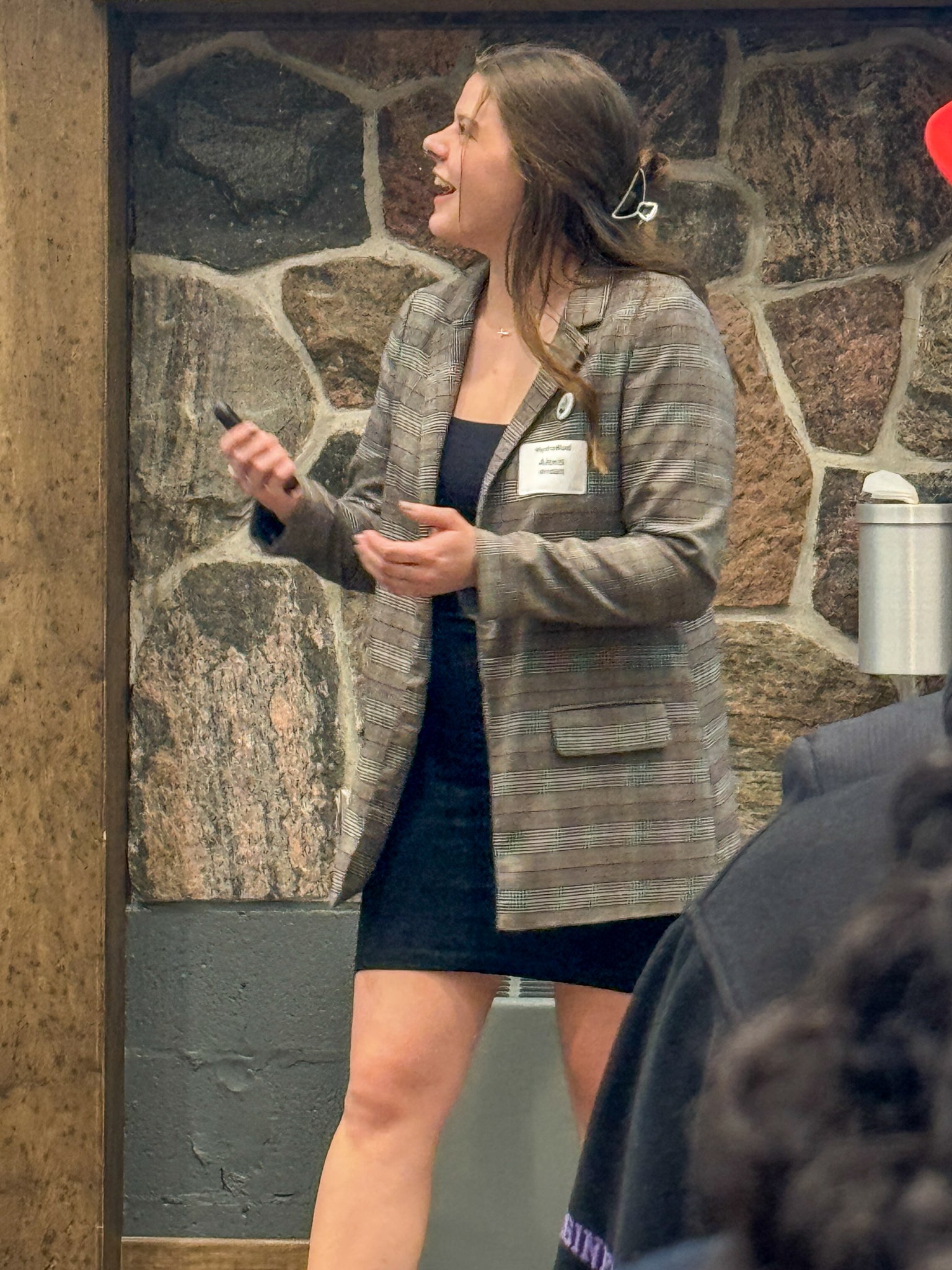
Waterloo students, Alexis Windatt and Rumaisha Qadar, pitched their hydroponic company, Hydrobud, whose mission is to reconnect the citizens of Toronto with nutrient-dense leafy greens.
Over a three-day period, community members placed their votes online for the People's Choice award. Hydrobud received almost one third of the total number of votes, making them the winter 2024 People’s Choice award and adding an additional funding of $1,000 to grow their self-sustainable hydroponics systems.
Venue Behaviour – $1,500
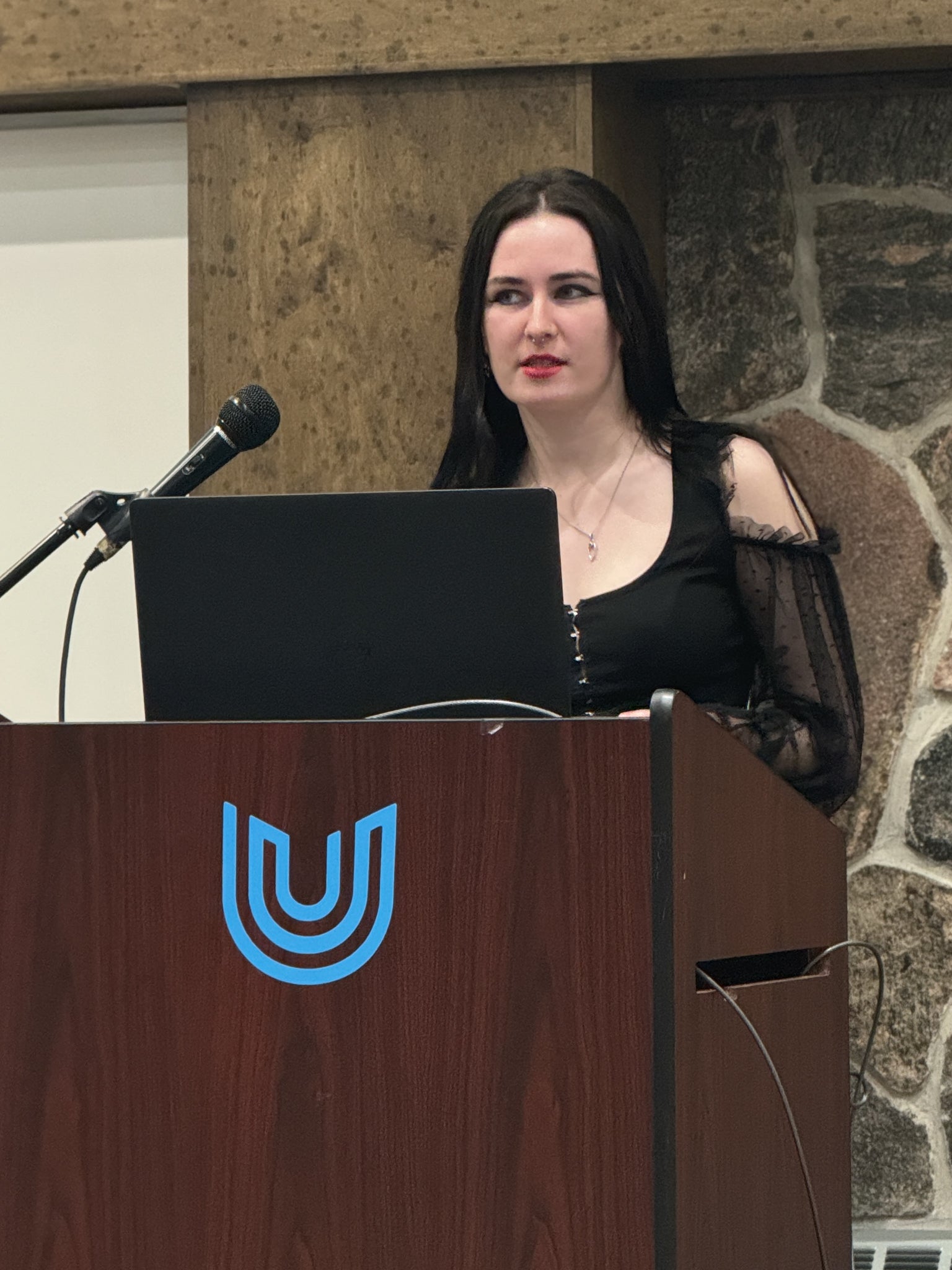 Emma Schuster, an environmental studies student, was concerned about Canada’s music venues struggling to keep up with sustainable best practices. Canada is home to 823 live music venues that experience issues with recycling to a point that is environmentally shocking to most people, explained Schuster.
Emma Schuster, an environmental studies student, was concerned about Canada’s music venues struggling to keep up with sustainable best practices. Canada is home to 823 live music venues that experience issues with recycling to a point that is environmentally shocking to most people, explained Schuster.
Venue Behaviour will create a framework with tailored action plans for each individual venue on how they can incorporate sustainability into their live events. From water usage to ticketing providers, Venue Behaviour will act as a sustainable consulting firm that will provide resources and support for music venues to become more sustainable.
With the Social Impact Fund, Schuster’s goal is to obtain two certifications: Leadership in Energy and Environmental Design and a certificate in the Environmental Professional in Training program to add reputability and increase her knowledge. Schuster has also received offers from her advisors to visit the sustainable landscape that already exists in the music industry in British Columbia this summer.
EchoNotes – $1,000
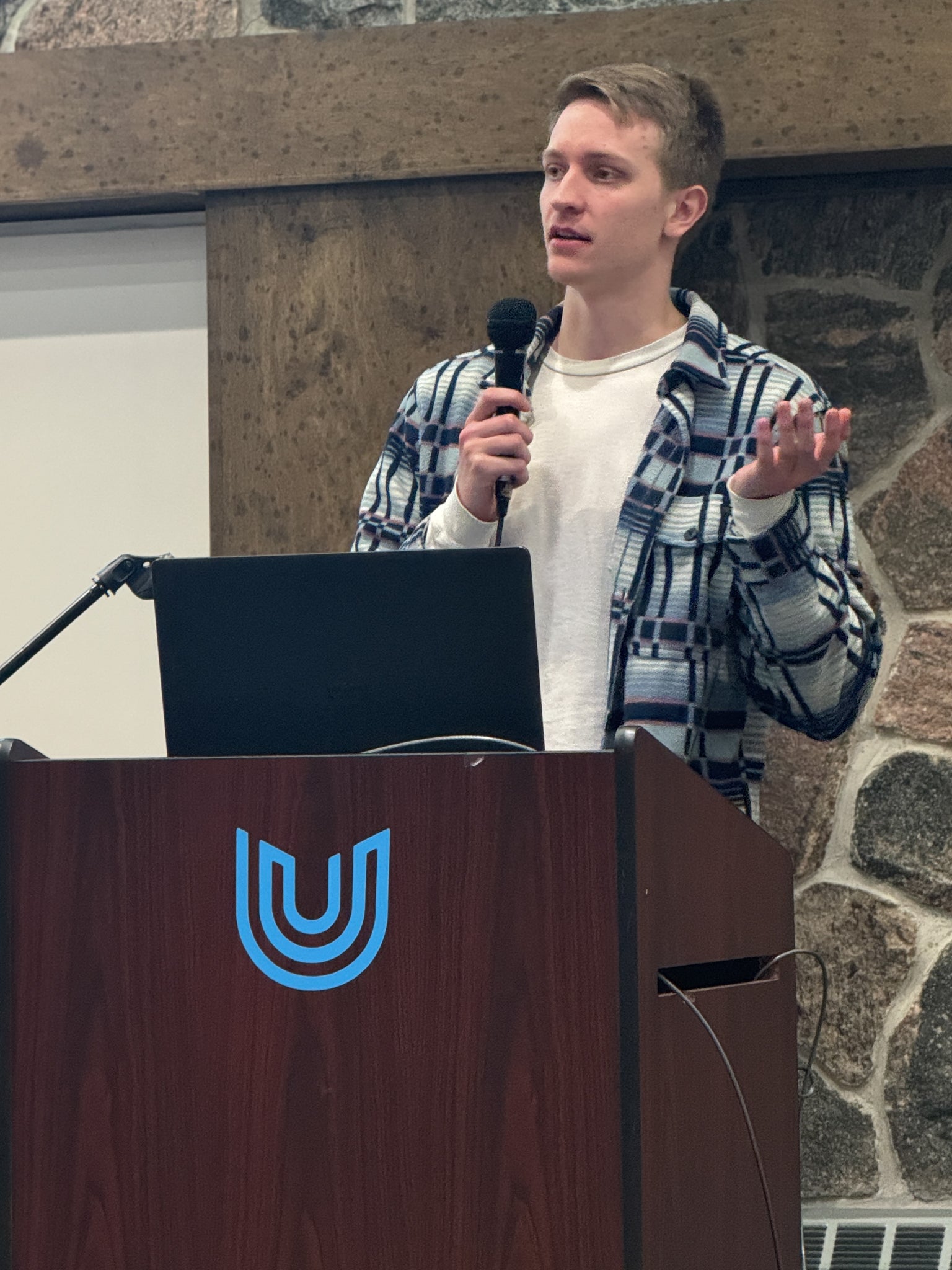 Computer science student, Josiah Plett, grew up as an insomniac where he spent many nights in his head feeling like a completely separate person.
Computer science student, Josiah Plett, grew up as an insomniac where he spent many nights in his head feeling like a completely separate person.
“What if I could have a conversation between that nighttime personality that felt separate with that daytime personality — what if you could talk with your future self?” said Plett.
While there are existing solutions, such as sending an email to your future self, Plett struggled with the idea of not having a mobile solution for shorter time spans.
He added that clinical psychological research has proven that the number one way to develop a trait of self-continuity is to reflect with yourself across time, whether that be sending emails or looking back at your past journaling. His solution, EchoNotes, is a self-messaging platform designed to naturally and easily connect you to your future self.
Plett is certain that with his experience as an indie game developer, he can develop EchoNotes and tap into his personal connection of self-help influencers and the world’s largest ADHD YouTuber, How to ADHD, who has 1.7 million subscribers. During their initial pilot program over the summer, Plett wants to reach at least 10,000 of those users. While looking to connect with clinical psychologists to learn more on how his team can spread information about EchoNotes into the education and clinical space.
CareConnect – $1,000
When MBET student, Kevin Shang Ye, needed to find a caregiver for his grandmother who suffers from different diseases, he discovered that there is a caregiver shortage in Canada. Ye explained how traditional care agencies are suffering a 40 per cent shortage, leaving clients experiencing a four to five week wait period to get in contact with a local caregiver.
Ye developed CareConnect, a platform that connects clients with caregivers seamlessly to arrange in-home health care. CareConnect is focused on providing flexible solutions for both their clients and caregivers.
Currently, Ye has met with 14 caregivers and elders who are on board. CareConnect plans to expand to the Greater-Toronto Area and Middlesex County in the next six months, with the potential to reach a global scale in the future.
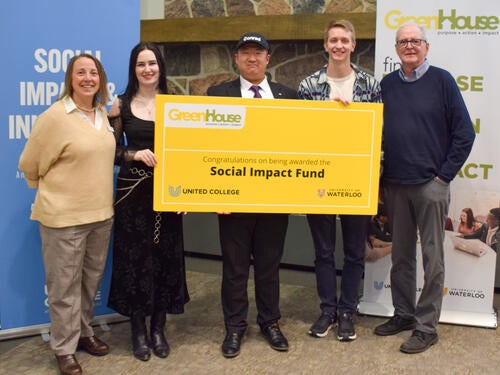
From left to right: Tania Del Matto, Emma Schuster, Kevin Shang Ye, Josiah Plett and Graham Brown. Early-stage startups Venue Behaviour, CareConnect and EchoNotes receive the Social Impact Fund for stage one student ventures.
Interested in making social or environmental change? Learn more about the GreenHouse Social Impact Showcase that is held each term and get started on your venture idea today by visiting the United College website.

Read more
A new minor in Social Innovation and Impact is paving the way for countless ventures with untold impact

Read more
Here are the people and events behind some of this year’s most compelling Waterloo stories
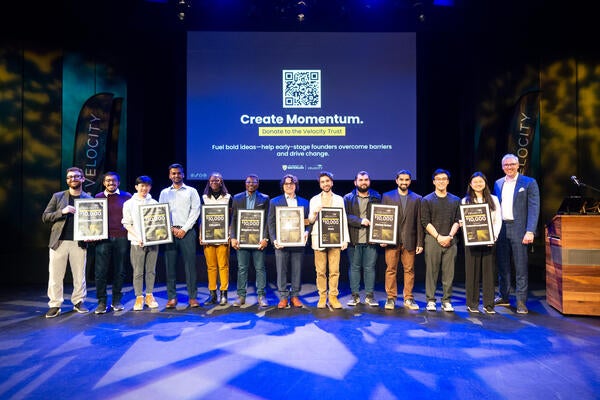
Read more
From non-invasive health care solutions to sustainable construction material and AI-driven coaching, the funding supports future-centric ventures
The University of Waterloo acknowledges that much of our work takes place on the traditional territory of the Neutral, Anishinaabeg, and Haudenosaunee peoples. Our main campus is situated on the Haldimand Tract, the land granted to the Six Nations that includes six miles on each side of the Grand River. Our active work toward reconciliation takes place across our campuses through research, learning, teaching, and community building, and is co-ordinated within the Office of Indigenous Relations.